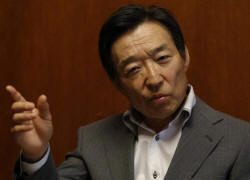|
BOJ's Iwata sees no need
to raise rates now as economy needs support
 Send a link to a friend
Send a link to a friend
 [June 22, 2017]
By Leika Kihara [June 22, 2017]
By Leika Kihara
AOMORI, Japan (Reuters) - Bank of Japan
Deputy Governor Kikuo Iwata on Thursday dismissed the need to raise
interest rates any time soon, stressing that the economy still requires
support from "powerful" monetary easing, with inflation far from the
central bank's 2 percent target.
He also called for maintaining the BOJ's loose pledge to increase its
government bond holdings by 80 trillion yen ($721 billion) per year,
even though recently the pace of purchases has slowed significantly.
"Removing the pledge could cause unnecessary market turmoil," Iwata told
reporters after meeting business leaders in Aomori, northern Japan.
Japan's low inflation expectations mean its short-term real interest
rate, which is calculated by subtracting inflation expectations from
nominal interest rates, remains higher than that of the United States,
Iwata said.

The BOJ must therefore maintain its massive stimulus program, even if
global long-term interest rates rise on expectations of stronger world
economic growth and steady interest rate hikes by the U.S. Federal
Reserve, he said.
"Japan is still distant from achieving the BOJ's inflation target and
needs support from monetary easing," Iwata said in a speech.
"There is absolutely no need to raise interest rates and diminish the
degree of monetary easing, which is not that big compared with that of
the United States," he said.
BOND-BUYING PLEDGE STILL NECESSARY
Japan's economy expanded at an annualized rate of 1.0 percent in the
first quarter on robust exports and a boost from private consumption,
prompting the BOJ to upgrade its economic assessment in April.
But core consumer prices rose just 0.3 percent in April from a year
earlier, well below the BOJ's target, as companies remain wary of
raising prices for fear of scaring away cost-sensitive households.
The BOJ is set to upgrade its economic assessment but cut its inflation
forecast at a quarterly review of its projections in July, sources have
told Reuters.
Iwata countered the view that recent renewed falls in oil costs could
force the BOJ to downgrade again its rosy inflation forecasts at next
month's rate review.
[to top of second column] |

Bank of Japan's (BOJ) Deputy Governor Kikuo Iwata speaks during an
interview with Reuters at the BOJ headquarters in Tokyo June 24,
2013. REUTERS/Toru Hanai

"I don't think temporary falls in oil costs would affect Japan's inflation trend
that much," he said. "Japan's economy is in a recovery phase and will do very
well ahead."
After three years of heavy asset buying failed to drive up inflation, the BOJ
revamped its policy focus last year to one capping long-term interest rates
rather than targeting the pace of money printing.
But the central bank maintained a loose pledge to keep buying bonds so its
holdings increase at 80 trillion yen per year, partly to appease proponents of
aggressive money printing in the nine-member board such as Iwata.
Some analysts believe the BOJ will soon abandon the pledge as the pace of bond
buying has recently slowed to around 60 trillion yen, making the guidance
obsolete and largely symbolic.
Iwata dismissed such views, saying that removing the pledge now could cause
market turmoil because the BOJ could be forced to ramp up bond buying again if
external factors push up Japanese yields.
"The BOJ can guide monetary policy more flexibly by keeping the bond-buying
pledge and purchasing bonds flexibly under the guidance," he said.

An architect of the BOJ's huge asset-buying program, Iwata has been among board
members who place more emphasis on the boost the bank's massive money printing
could have on the economy and inflation expectations.
Growing signs of life in Japan's economy have presented the BOJ with a fresh
communications challenge, pushing it to be clearer with markets on how it might
dial back its stimulus - even though such action remains a long way off.
(Reporting by Leika Kihara; Editing by Shri Navaratnam and Richard Borsuk)
[© 2017 Thomson Reuters. All rights
reserved.] Copyright 2017 Reuters. All rights reserved. This material may not be published,
broadcast, rewritten or redistributed. |